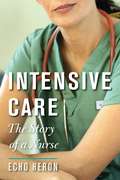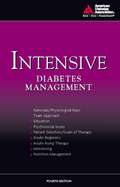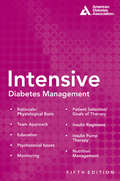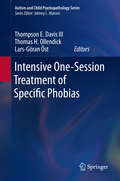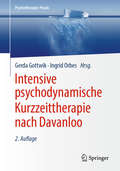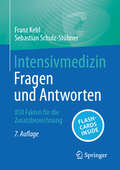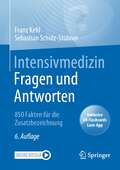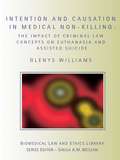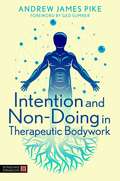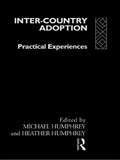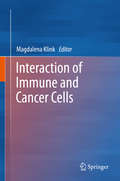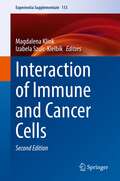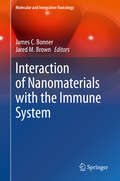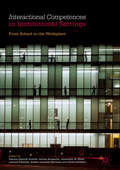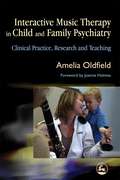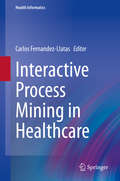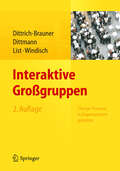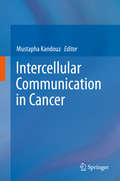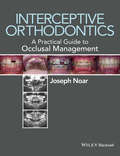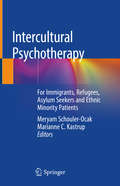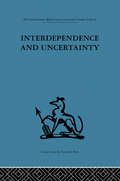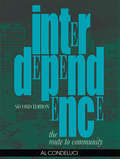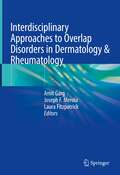- Table View
- List View
Intensive Care: The Story of a Nurse
by Echo HeronIlluminates the day-to-day routine and texture of a nurse's life through an account of the author's career that spans from training to practice to burnout.
Intensive Diabetes Management
by American Diabetes Association Joseph I. WolfsdorfVirtually all patients with diabetes (type 1 or type 2) can improve their glycemic control and overall health through intensive diabetes management. With emphasis on the team approach, Intensive Diabetes Management offers the information you need to help each patient move toward treatment goals appropriate for their individual skills and medical condition. For clinicians striving to deliver diabetes therapy for the 21st century, this is the essential guide.
Intensive Diabetes Management
by Joseph I. WolfsdorfIntensive diabetes management is the process by which blood glucose levels are closely controlled using multiple daily insulin injections or an insulin pump. People who use this method of diabetes management must be closely aligned with their health care team and highly motivated because it not only requires close scrutiny of blood glucose levels, but also constant monitoring of food intake and medication dosage, among other things.Although difficult to maintain, intensive diabetes management has proven very effective and is now the rule, rather than the exception, in diabetes care. Virtually all patients with diabetes-type 1 or type 2-can improve their glycemic control and overall health through intensive diabetes management.Intensive Diabetes Management is geared toward the health care practitioner who wants to implement this method in his or her patients. It emphasizes a team approach to patient care and offers guidance in helping patients move toward treatment goals appropriate for their individual skills and medical condition.Individual sections address all of the key topics in intensive diabetes management, including:Rationale/Physiological BasisTeam ApproachEducationPyschosocial IssuesPatient Selection/Goals of TherapyInsulin RegimensInsulin Pump TherapyMonitoringNutrition ManagementThis new edition is updated to cover the latest advances in medical research. New insights into diabetes and how they impact this particular treatment are covered. In addition, the data, guidelines, and procedures have been revised to reflect that newest positions of the American Diabetes Association's standards of care.
Intensive One-Session Treatment of Specific Phobias
by Thomas H. Ollendick Lars-Göran Öst Thompson E. Davis IIIWhether it's dogs, spiders, blood, heights or some other fear, specific phobias are one of the most prevalent mental health problems, affecting as many as one in eight people. In recent years, cognitive-behavioral therapy (CBT) has emerged as particularly effective in treating young people and adults with specific phobias. And of these methods, one-session treatment stands out as a long-lasting, cost-effective intervention of choice. Intensive One-Session Treatment of Specific Phobias not only provides a summary of the evidence base, it also serves as a practical reference and training guide. This concise volume examines the phenomenology, epidemiology, and etiology of phobias, laying the groundwork for subsequent discussion of assessment strategies, empirically sound one-session treatment methods, and special topics. In addition, expert contributors address challenges common to exposure therapy, offer age-appropriate guidelines for treating young clients, and describe innovative computer-assisted techniques. Organized to be read individually or in sequence, chapters delve into key areas, including: Evidence-based assessment and treatment of specific phobias in children, adolescents, and adults.One-session treatment theory and practice with children, adolescents, and adults.Handling difficult cases of specific phobias in youth.Interventions for specific phobias in special populations.Training and assessing therapists in one-session treatment.Ethical issues in considering exposure. Intensive One-Session Treatment of Specific Phobias is an essential resource for researchers, clinicians, and graduate students in child, school, clinical, and counseling psychology; social work; and general and special education.
Intensive psychodynamische Kurzzeittherapie nach Davanloo (Psychotherapie: Praxis)
by Gerda Gottwik Ingrid OrbesDie Intensive Psychodynamische Kurzzeittherapie nach Prof. Habib Davanloo (IS-TDP) basiert auf 40 Jahren empirischer Forschung und ist eine umfassende, revolutionäre Therapiemethode für alle neurotischen Störungen und Persönlichkeitsstörungen. In diesem bisher einzigen deutschsprachigen Werk zu IS-TDP wird das Konzept ausführlich erläutert. Neben einer Einführung in die Theorie bietet es viele Beispiele, die die besondere technische Intervention der IS-TDP aufzeigen. Behandelt wird ferner die Anwendung der Therapie bei verschiedenen Störungsbildern.
Intensivmedizin - Fragen und Antworten: 850 Fakten für die Zusatzbezeichnung
by Sebastian Schulz-Stübner Franz KehlWollen Sie als Fachärztin oder Facharzt die Zusatzweiterbildung Intensivmedizin absolvieren oder in der Intensivmedizin arbeiten? Dann können Sie Ihr Wissen mit diesem Lernbuch oder der App SN Flashcards optimal überprüfen! Über 170 Multiple-Choice-Fragen mit kommentierten Antworten bringen Sie auf den aktuellen Stand von Themen der Intensivmedizin wie Pharmakotherapie, Atmung und Beatmung, Infektiologie, Notfälle und Komplikationen. Plus: Fallorientierte Fragen und Auszüge von über 70 wichtiger klinischer Studien mit Kernaussagen und neu: Aktualisierung bekannter Themen und Ergänzung um „Hot Topics“ der Intensivmedizin aufgrund aktueller Entwicklungen in der Literatur. Ideal für Fachärztinnen und Fachärzte der Anästhesiologie, Chirurgie, Innere Medizin, Neurochirurgie, Neurologie und Wiedereinsteiger*innen in der Intensivmedizin.
Intensivmedizin Fragen und Antworten: 850 Fakten für die Zusatzbezeichnung
by Sebastian Schulz-Stübner Franz KehlStehen Sie als Facharzt kurz vor Ende der Zusatzweiterbildung oder wollen in der Intensivmedizin arbeiten? Dann können Sie Ihr Wissen mit diesem Taschenbuch oder der App SN Flashcards optimal überprüfen! Über 170 Multiple-Choice-Fragen mit kommentierten Antworten bringen Sie auf den aktuellen Stand von Themen der Intensivmedizin wie Pharmakotherapie, Atmung und Beatmung, Infektiologie, Notfälle und Komplikationen. Plus: Fallorientierte Fragen und Auszüge wichtiger klinischer Studien mit Kernaussagen.Neu: komplett aktualisiert plus App SN Flashcards zum digitalen Lernen und Wiederholen. So können Sie sich jederzeit und gezielt auf ausgewählte Themen vorbereiten.Ideal für Fachärzte der Anästhesiologie, Chirurgie, Innere Medizin, Neurochirurgie, Neurologie und Wiedereinsteiger in der Intensivmedizin.
Intention and Causation in Medical Non-Killing: The Impact of Criminal Law Concepts on Euthanasia and Assisted Suicide (Biomedical Law and Ethics Library)
by Glenys WilliamsAnalyzing the concepts of intention and causation in euthanasia, this timely new book explores a broad selection of disciplines, including criminal and medical law, medical ethics, philosophy and social policy and suggests an alternative solution to the one currently used by the courts, based on grading different categories of killing into a formalized justificatory defence. This text explores how culpability, blameworthiness and liability are ascribed and how ascertaining mens rea and actus reus are problematic in an end-of-life decision-making scenario. Williams criticizes the way the courts rely so exclusively on the criminal concepts of intention and causation in such medical scenarios and examines and raises awareness of the inadequate and inappropriate legal framework within in which judges have to operate. Topical and compelling, this significant contribution argues for a more open and honest approach which would, in turn, provide the certainty, consistency and equality required by the law. This is a quintessential read for all students studying medical and healthcare law and the legal aspects of health and medicine.
Intention and Non-Doing in Therapeutic Bodywork
by Andrew PikeExploring the Buddhist/Taoist concept of non-doing and intention in relation to bodywork, this book focuses on how the therapist should approach their client without agenda and meet them where they are at. This requires the therapist to pay attention to their own surfacing intentions and leave assumptions behind so they may focus on simply 'being', which is a profoundly active, non-reactive expression of presence, rather than a passive state of resignation. The ramifications of sub-conscious doing and wilful intention can negatively impact expressions of health and so the author explains how therapists may skilfully navigate between intention, attention and embodied non-doing whilst treating clients, and how this creates the foundations for safe relational touch.
Inter-Country Adoption: Practical Experiences
by Michael Humphrey Heather HumphreyThere can be no doubt that intercountry adoption has grown in popularity over the past decade and many childless couples are now considering it as one option in the struggle to achieve a family. By presenting eight first-hand accounts from couples who have adopted from abroad,Inter-Country Adoption offers fascinating insight to the emotional, financial and legal difficulties that prospective adoptive parents must face.
Interaction of Immune and Cancer Cells
by Magdalena KlinkThe tumor environment is a dynamic network that includes cancer cells, immune cells, fibroblasts, endothelial cells, extracellular matrix, cytokines and receptors. The aim of this book is to summarize the role of these components, especially immune cells, in tumor suppression and/or progression and describe in detail why tumor cells can survive and spread in spite of the antitumor response of immune cells. Since immunotherapy is an attractive approach to cancer therapy, this book also provides information on the two main strategies: monoclonal antibodies and adaptive T cell immunotherapy, with a focus on recent human clinical trials. The book provides a state-of-the-art, comprehensive overview of immune cells in cancer and is an indispensable resource for scientists and medical doctors working and/or lecturing in the field of cancer research and immunology.
Interaction of Immune and Cancer Cells (Experientia Supplementum #113)
by Magdalena Klink Izabela Szulc-KielbikNow, it its second edition, this book summarizes the role of immune cells in tumor suppression and progression. It describes in detail why tumor cells can survive and spread in spite of the antitumor response of immune cells. Since immunotherapy is an attractive approach to cancer therapy, this book also provides information on the two main strategies: monoclonal antibodies and adaptive T cell immunotherapy, with a focus on recent human clinical trials. A newly added chapter also focuses on the role of Natural Killer cells in tumor progression. The book provides a state-of-the-art, comprehensive overview of immune cells in cancer and is an indispensable resource for researchers and practitioners working or lecturing in the field of cancer research and immunology.
Interaction of Nanomaterials with the Immune System (Molecular and Integrative Toxicology)
by Jared M. Brown James C. BonnerThis book covers the latest information related to understanding immune responses to engineered nanomaterials (ENMs). Many ENMs used in both the consumer and biomedical fields have been reported to elicit adverse immune responses ranging from innate immune responses such as complement activation to changes in adaptive immunity that influence pathogen responses and promote disease states such as asthma. Interaction of Nanomaterials with the Immune System covers the most up to date information on our understanding of immune responses to ENMs across a wide range of topics including innate immunity, allergic immune responses, adaptive provides the reader with (1) up to date understanding of immune responses to ENMs; (2) current testing methods; and (3) appropriate models including alternative testing strategies for evaluating immunotoxicity of ENMs.
Interactional Competences in Institutional Settings
by Laurent Filliettaz Simona Pekarek Doehler Adrian Bangerter Geneviève De Weck Esther González-Martínez Cécile PetitjeanThis interdisciplinary volume brings together leading scholars from several disciplines to uncover the key to young people's socialization within institutional settings, from school to the workplace. Among the questions they consider are: what aspects of interactional competence are relevant for participation in practical activities within those settings? What are the interactional procedures through which diverse facets of interactional competence are recognized, legitimized and assessed in the course of practical activities? How do these procedures shape and reflect social institutions and people's understanding of them? The collection discusses interactional competences across a variety of institutional settings, and reflects on the institutional order by scrutinizing how such competences are interactionally treated within everyday institutional practices. The volume enriches an interdisciplinary understanding of fundamental concepts in the social sciences and will therefore be of interest to those working within linguistics, sociology, education, psychology of work, and speech therapy.
Interactive Music Therapy in Child and Family Psychiatry: Clinical Practice, Research and Teaching
by Amelia Oldfield Jo Holmes'What is truly distinctive about this book is that Oldfield introduces her doctoral research, in which she created the Music Therapy Diagnostic Assessment (MTDA) in comparison to one of the most internationally recognized standardized diagnostic tool.' - Autism Diagnostic Observation Schedule (ADOS). 'I believe that the book will be useful for music therapy students, and novice music therapist working in child and family psychiatry and related fields.' - Nordic Journal of Music Therapy 'In her indomitable, accessible and straightforward style, Amelia Oldfield continues to champion the use of music therapy with families in her most recent publication. The book is in many ways a step-by-step music therapy manual, informing us of music therapy methods and innovations and provoking new thoughtfulness for work within the child mental health setting.' - Journal of Family Therapy 'This book could be an invaluable resource for readers who are looking for evidence that music therapy can have a very positive effect on certain disorders and family dynamics. I could imagine it would bring great hope for those whose children find communication very difficult, or where families are struggling to relate emotionally. The book [also] has a lot of clinical research data, which would be extremely useful for students or clinicians needing to validate this kind of work.' - ACCord Magazine 'This practical book outlines and explains the rationale for using music therapy in child and family psychiatry. Amelia Oldfield reflects on current research methodology and describes characteristics of her own approach to therapy sessions, including how to start and end the session, how to motivate children and establish a positive musical dialogue with them, and how to include parents in the session. She also uses video analysis techniques to assess and advance the role of the therapist. Individual chapters focus on the results of the author's research investigations with specific groups such as mothers and young children, groups of adults with profound difficulties, children with autistic spectrum disorder or severe physical and mental difficulties, as well as children without clear diagnosis. Case studies and vignettes supplement these examples. The author also considers the whole process from the initial referral for therapy and using psychiatric music therapy for diagnostic assessment to how to end treatment. This book is accessible to music therapists, psychiatrists, nurses and occupational therapists working with children and families, as well as music therapy trainers, their students and academics interested in music therapy.' - British Society for Music Therapy 'Those who are specifically interested in music therapy as applied to children and families will find no better mentor than Oldfield.' - Mental Health Care Practice 'Well, this book was a pleasant surprise! I found it a remarkably uplifting read. Amelia Oldfield describes in detail how she has managed to interact through music with children (and adults) with a wide range of significant difficulties, intellectual, emotional and physical. Her music therapy is intended to help with diagnosis but she also involved parents and carers in her sessions in a way which helps them to come to terms with and deal more comfortably with their charges.' - Adoption.net This practical book outlines and explains the rationale for using music therapy in child and family psychiatry. Amelia Oldfield reflects on current research methodology and describes characteristics of her own approach to therapy sessions, including how to start and end the session, how to motivate children and establish a positive musical dialogue with them, and how to include parents in the session. She also uses video analysis techniques to assess and advance the role of the therapist. Individual chapters focus on the results of the author's research investigations with specific groups such as mothers and young children, groups of adults with profound difficulties, children with autistic spectrum disorder or severe phy...
Interactive Process Mining in Healthcare (Health Informatics)
by Carlos Fernandez-LlatasThis book provides a practically applicable guide to the methodologies and technologies for the application of interactive process mining paradigm. Case studies are presented where this paradigm has been successfully applied in emergency medicine, surgery processes, human behavior modelling, strokes and outpatients’ services, enabling the reader to develop a deep understanding of how to apply process mining technologies in healthcare to support them in inferring new knowledge from past actions, and providing accurate and personalized knowledge to improve their future clinical decision-making. Interactive Process Mining in Healthcare comprehensively covers how machine learning algorithms can be utilized to create real scientific evidence to improve daily healthcare protocols, and is a valuable resource for a variety of health professionals seeking to develop new methods to improve their clinical decision-making.
Interaktionsspiele bei Psychopathie: Antisoziale Manipulation erkennen und konstruktiv bewältigen (Psychotherapie: Praxis)
by Rainer Sachse Fritjof von FranquéIm vorliegenden Buch wird beschrieben, wie manipulatives Handeln von Personen mit Psychopathie erkannt und bewältigt werden kann. Die psychopathische Persönlichkeitsstörung (engl.: Psychopathy) ist definiert durch eine Kombination aus interaktionellen, affektiven, antisozialen und sich im Lebensstil ausdrückenden Besonderheiten, zu denen Egozentrizität, manipulierendes Verhalten, ein Mangel an Mitgefühl, Schuld und Reue, pathologisches Lügen, Verantwortungslosigkeit sowie die kontinuierliche Verletzung sozialer Normen und Erwartungen zählen. Fachleute haben vor allem Schwierigkeiten, mit den interpersonellen Merkmalen dieser Störung umzugehen. Dieses Buch bietet hierfür konkrete Unterstützung. Geschrieben für … Psychotherapeuten, Coaches, Diagnostiker, Psychiater, forensische Psychologen und alle, die beruflich mit Psychopathen zu tun haben. Die Autoren: Prof. Dr. Rainer Sachse ist Psychologischer Psychotherapeut, Begründer der „Klärungsorientierten Psychotherapie“ und Leiter des Instituts für Psychologische Psychotherapie (IPP) in Bochum. Fritjof von Franqué ist sexualforensischer Psychotherapeut und leitender Psychologe am Institut für Sexualforschung und Forensische Psychiatrie des Universitätsklinikums Hamburg-Eppendorf (UKE).
Interaktive Großgruppen: Change-Prozesse in Organisationen gestalten
by Carmen Windisch Volker List Karin Dittrich-Brauner Eberhard DittmannOrganisationen und ihre Mitarbeiter verändern sich fortlaufend und lernen dazu, um konkurrenzfähig zu bleiben. Zu diesem Zweck setzen Unternehmen immer häufiger Großgruppenverfahren ein, denn diese haben klassischen Workshopmethoden einiges voraus: Sie erzeugen Bewegung, initiieren Kontakte und Diskussionen, fördern die Identifikation und garantieren die Nachhaltigkeit von Veränderungen in Organisationen - kurz: sie binden auf aktive und effektive Weise viele Menschen in einen gemeinsamen Entwicklungsprozess ein. Die Arbeit mit großen Gruppen ist gleichzeitig zielführend und unterhaltsam. Alles drin: Zum einen "klassische Verfahren" wie Zukunftskonferenz, Open Space, Appreciative Inquiry, RTSC, World Café, sowie deren Entwicklung, Einsatzgebiete, Ablauf und Nutzen. Zum anderen Weiterentwicklungen und Trends, neue Anforderungen, integrative Ansätze, Einbindung neuer Technologien u.v.m., sowie Tipps zur Dramaturgie in Großgruppen. Direkt loslegen: Mit konkreten Tipps, Checklisten, Experteninterviews, Fallbeispielen und Erfahrungsberichten aus bekannten Unternehmen, Hinweisen zu speziellen Einsatzmöglichkeiten von Großgruppenverfahren und, damit nichts schiefgeht, Vorbereitungs-Tipps zu Räumlichkeiten, Ton, Visualisierung, Dokumentation und Zeitplanung. Die zweite Auflage wurde aktualisiert und um aktuelle Themen (u.a. Social Media, Großgruppen in Veränderungsprojekten) ergänzt.
Intercellular Communication in Cancer
by Mustapha KandouzCells are by nature compelled to live in groups. They develop dependence over signaling cues received from their microenvironment, in particular from other cells, whether of their own "kind" or of a different type. Therefore, communicating with these cells is a critical aspect of their behavior and fate, as they live and die normally or as they undergo disease-related pathological changes, with dramatic repercussions. In this book, we have asked expert researchers in the field of Intercellular Communication in Cancer to provide chapters on different aspects of interaction between neighboring cells, in the context of cancer diseases. We have specifically focused our efforts on membrane-to-membrane contact-based rather than growth factors-mediated modes of intercellular communications. The contributing authors provide an extensive overview of their respective area of specialization, with an in-depth discussion of the molecular mechanisms of cell-cell interactions, the impact on tumor progression and response to therapies, as well as the cancer diagnostic value of this scientific information. This book aims to introduce essential aspects of the normal and pathological cellular fate and homeostasis to both scientists and clinicians, and also to provide established researchers with an update on the novelties and future directions this expanding field is witnessing.
Interceptive Orthodontics
by Joseph NoarIdentify problems and introduce solutions early for an ideal aesthetic result Interceptive Orthodontic saims to guide the practitioner in the art of interceptive management of the developing dentition. The goal is to guide the permanent dentition into the line of the dental arches, avoiding complex orthodontic treatment for teeth displaced far from their ideal position, and thereby reducing orthodontic treatment time. This book covers growth of the jaws and tooth development, and explains the correct timing of interceptive management. It also discusses orthodontic assessment, special investigations and comprehensive management of the mixed dentition, taking in the issues of early crowding, impaction, supernumerary and supplemental teeth, dental arch expansion, space maintenance and space management. In line with best available evidence, it provides clear treatment objectives and detailed treatment planning advice.Practical, accessible and illustrated with a wealth of colour images, this is an ideal clinical companion for general dental practitioners, oral surgeons, paediatric dentists and orthodontists. It is also a valuable reference for all training grades.
Intercultural Psychotherapy: For Immigrants, Refugees, Asylum Seekers and Ethnic Minority Patients
by Meryam Schouler-Ocak Marianne C. KastrupThis book is intended to sensitise psychotherapists, to strengthen practitioners’ intercultural competence and to encourage them to form psychotherapeutic relationships with people with an immigration background who are suffering from mental health problems. In this context, intercultural psychotherapy refers to the therapeutic work between psychotherapists and patients who hail from different cultural contexts, which often considerably hampers language- and culture-based understanding. In the current context of globalisation and growing crises around the world, an increasing number of people with a migration background require psychotherapeutic treatment; as a result, intercultural psychotherapy may well become the rule rather than the exception. Psychotherapists are therefore challenged to adapt to such a context. Overcoming these barriers requires certain competencies such as working with a qualified interpreter. Contributions from international experts from the field of intercultural psychotherapy provide vital insights into the theory and practice of intercultural work with patients suffering from conditions such as PTSD, depression, anxiety, personality disorders and schizophrenic disorders. These interdisciplinary specialists describe their work, share valuable lessons learned, and put forward concrete recommendations.
Intercultural Variation in Family Research and Theory: Implications for Cross-National Studies Volumes I & II
by Marvin B Sussman Roma S HanksIntercultural Variation in Family Research and Theory sets forth 23 critical reviews in a 2-volume set that document the development of family research and theory in various societies around the world. Focusing on modern research while drawing on the historical roots of theoretical and methodological approaches employed in the study of family, this collection not only increases your knowledge about the status of family research in various countries, but also inspires cross-national research among researchers and scholars. The societies being studied have been grouped by region: Volume I contains the set&’s Introduction and contributions from the Far East, the Baltic region, Australia, and South Africa. Volume II covers the Middle East, Western Europe, Scandinavia, and also includes the Index.The materials in these two volumes are the result of the charge given to scholars of 23 societies to review the development of family theory and research in their homelands. Their obligation was to provide an analytic report telling a story from their perspective of reality. The book&’s editors now present some of the commonality of experiences and trends of the researchers and interpret country differences and similarities from their writings. Intercultural Variation in Family Research and Theory holds numerous suggestions for your investigations into the family field. You&’ll find that the set adds to the body of knowledge on comparative family analysis and raises concerns and issues for future research. The questions anddressed in this book include:how gender of the investigator influences choice of research topicshow funding sources shape the research agendawhat influence a researcher&’s career trajectory has on research topics, methods, and procedureswhy psychological and sociological frameworks and methodologies are commonly used in family researchhow political policy influences and dictates theory development and research what to do about the multitude of new questions that inevitably arise from such intercultural research
Interdependence and Uncertainty: A study of the building industry
by Charles CrichtonTavistock Press was established as a co-operative venture between the Tavistock Institute and Routledge & Kegan Paul (RKP) in the 1950s to produce a series of major contributions across the social sciences. This volume is part of a 2001 reissue of a selection of those important works which have since gone out of print, or are difficult to locate. Published by Routledge, 112 volumes in total are being brought together under the name The International Behavioural and Social Sciences Library: Classics from the Tavistock Press. Reproduced here in facsimile, this volume was originally published in 1966 and is available individually. The collection is also available in a number of themed mini-sets of between 5 and 13 volumes, or as a complete collection.
Interdependence: The Route to Community, Second Edition
by Al CondeluciDriven from a values base, Interdependence: The Route to Community is a service system framework that interprets a new approach for the ways in which people relate and the ways our society addresses social issues. Recognizing the limitations of the medical/expert approach, the book offers a new prescription for change based on partnership. This pen
Interdisciplinary Approaches to Overlap Disorders in Dermatology & Rheumatology
by Amit Garg Joseph F. Merola Laura FitzpatrickThis comprehensive textbook provides physicians with a practical evidence-based framework to evaluate and manage patients suspected of having overlap disorders involving the integumentary, musculoskeletal and related systems.The book discusses hallmark mucocutaneous features which support, and often specify, diagnosis, and it provides a summary of relevant multisystem examinations, serologic workup, and imaging. Interdisciplinary perspectives on treatment also facilitate a streamlined approach to referral and co-management. Interdisciplinary Approaches to Overlap Disorders in Dermatology & Rheumatology is a must-have resource for dermatologists, rheumatologists, internists, as well as students of medicine and trainees across medical specialties.
